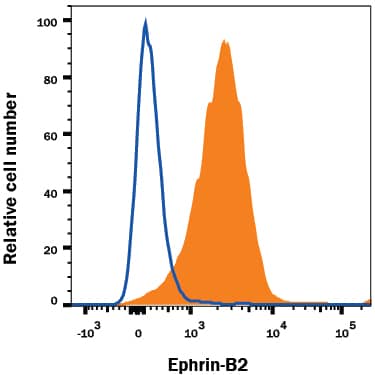Human/Mouse/Rat Ephrin-B2 Antibody Best Seller
R&D Systems, part of Bio-Techne | Catalog # AF496


Key Product Details
Species Reactivity
Validated:
Cited:
Applications
Validated:
Cited:
Label
Antibody Source
Product Specifications
Specificity
Clonality
Host
Isotype
Scientific Data Images for Human/Mouse/Rat Ephrin-B2 Antibody
Detection of Mouse Ephrin-B2 by Western Blot.
Western blot shows lysates of mouse embryo tissue. PVDF membrane was probed with 1 µg/mL of Goat Anti-Human/Mouse/Rat Ephrin-B2 Antigen Affinity-purified Polyclonal Antibody (Catalog # AF496) followed by HRP-conjugated Anti-Goat IgG Secondary Antibody (Catalog # HAF019). Specific bands were detected for Ephrin-B2 at approximately 40-45 kDa (as indicated). This experiment was conducted under reducing conditions and using Immunoblot Buffer Group 8.Detection of Ephrin‑B2 in SH‑SY5Y Human Cell Line by Flow Cytometry.
SH-SY5Y human neuroblastoma cell line was stained with Goat Anti-Human/Mouse/Rat Ephrin-B2 Antigen Affinity-purified Polyclonal Antibody (Catalog # AF496, filled histogram) or isotype control antibody (Catalog # AB-108-C, open histogram), followed by Phycoerythrin-conjugated Anti-Goat IgG Secondary Antibody (Catalog # F0107).Ephrin‑B2 in Rat Hippo-campal Neurons.
Ephrin‑B2 was detected in immersion fixed rat hippocampal neurons using 2 µg/mL Goat Anti-Human/Mouse/Rat Ephrin‑B2 Antigen Affinity-purified Polyclonal Antibody (Catalog # AF496) for 3 hours at room temperature. Cells were stained (red) and counterstained (green). View our protocol for Fluorescent ICC Staining of Cells on Coverslips.Applications for Human/Mouse/Rat Ephrin-B2 Antibody
CyTOF-ready
Flow Cytometry
Sample: SH‑SY5Y human neuroblastoma cell line
Immunocytochemistry
Sample: Immersion fixed cultured rat embryonic hippocampal neurons
Western Blot
Sample: Mouse embryo tissue
Reviewed Applications
Read 3 reviews rated 4.3 using AF496 in the following applications:
Formulation, Preparation, and Storage
Reconstitution
Formulation
*Small pack size (-SP) is supplied either lyophilized or as a 0.2 µm filtered solution in PBS.
Stability & Storage
Background: Ephrin-B2
Ephrin-B2, also known as Htk-L, ELF-2, LERK-5, and NLERK-1 (1), is a member of the ephrin ligand family which binds members of the Eph receptor family. All ligands share a conserved extracellular sequence, which most likely corresponds to the receptor binding domain. This conserved sequence consists of approximately 125 amino acids and includes four invariant cysteines. The B-class ligands are transmembrane proteins which can become tyrosine phosphorylated upon receptor ligation. The cytoplasmic domains are approximately 80 amino acids long and are highly conserved, especially the last 33 amino acids. Several signaling molecules have been shown to interact with the cytoplasmic region, although specific signaling roles have yet to be elucidated. Ephrin-B2 has been shown to bind EphA4, EphB1, EphB2, EphB3, and EphB4 (2, 3). The extracellular domains of murine and human Ephrin-B2 share 98% amino acid identity. Only membrane-bound or Fc-clustered ligands are capable of activating the receptor in vitro. While soluble monomeric ligands bind the receptor, they do not induce receptor autophosphorylation and activation (2). In vivo, the ligands and receptors display reciprocal expression (3). It has been found that nearly all the receptors and ligands are expressed in developing and adult neural tissue (3). The Ephrin/Eph families also appear to play a role in angiogenesis (3).
References
- Eph Nomenclature Committee [letter]. (1997) Cell 90:403.
- Flanagan, J.G. and P. Vanderhaeghen (1998) Annu. Rev. Neurosci. 21:309.
- Pasquale, E.B. (1997) Curr. Opin. Cell Biol. 9:608.
Alternate Names
Gene Symbol
UniProt
Additional Ephrin-B2 Products
Product Documents for Human/Mouse/Rat Ephrin-B2 Antibody
Product Specific Notices for Human/Mouse/Rat Ephrin-B2 Antibody
For research use only

